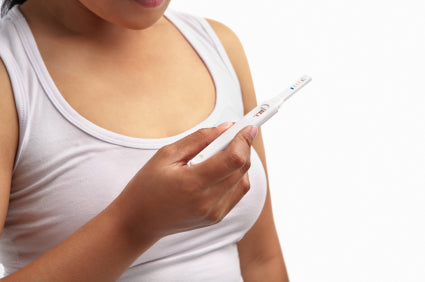
Common Earliest Signs of Pregnancy - Do You Have Any Of These Symptoms?
Am I Pregnant?
For some women, this question brings thoughts of joy and for some feelings of uncertainty. The two weeks, between conception and getting a positive pregnancy test, can be very stress filled. Here are some symptoms that are potentially pregnancy related. If you are lucky, they will be the precursor to a positive pregnancy test result.
Earliest Signs of Pregnancy
Do you suspect you might be pregnant? Until you can take a pregnancy test, you will have to rely on the signs and symptoms your body is showing. The most common early pregnancy symptoms include:
- Swollen breasts. Your breasts can begin to swell and become tender. You may notice this as early as two weeks after you become pregnant. They may feel fuller, sore, or tingly. You may even find yourself suddenly needing a larger cup size in your bras.
- Morning sickness. Many women who have just become pregnant assume they have the flu when they begin to feel nauseous or vomit suddenly. It’s important to note that morning sickness can come over you at any time of day. It may have an obvious trigger (a particular type of food or smell) or it might not.
- Heightened sense of smell. If you notice smells and odors which you typically don't, it may be a sign that a baby is on the way.
- Urinating frequently. Most women urinate more than usual throughout their pregnancy, especially during the night time. This symptom is often one of the earliest noticed.
- Cravings. If you find yourself having food cravings-especially if you’re craving something you wouldn’t typically eat-it’s a good sign you may be pregnant. These cravings are caused by the hormonal changes which occur during the first three months of pregnancy.
- Aversions. Like cravings, food aversions are caused by changing hormones. If foods or smells that generally wouldn’t bother you suddenly turn you off, you may want to go out and buy that home pregnancy kit.
- Cramping and spotting. These symptoms are the most deceptive of early pregnancy symptoms. Your normal menstrual cycle can have spotting and cramps too.
- Fatigue and dizziness. If you are feeling worn out or dizzy for no particular reason, get plenty of rest. Lower blood sugar levels, which occurs in the early stages of pregnancy, can make you feel dizzy and tired.
- Moodiness. Moodiness occurs with PMS just like cramping and spotting do. If you’re experiencing mood swings which aren’t a regular part of your cycle, it may be because a baby’s on the way.
You shouldn't interpret any of these signs as an absolute "I am pregnant!". They are, however, indicators that you should take a pregnancy test if your period doesn't arrive on schedule.
How Early Do Pregnancy Symptoms Start?
About 50% of women start noticing pregnancy symptoms around the time their period is late. Before that point, you may have a feeling that "something" is different, but you can't quite put your finger on it. You may also have the PMS type symptoms like moodiness, heartburn or sore breasts.
You will likely be hypersensitive to every little twitch and twinge that your body presents. Every twinge will scream "I'm pregnant!" but only time and patience will uncover the answer for you.
If you are lucky, you will be one of the 30% of women who have implantation bleeding. This bleeding can happen after a fertilized egg implants into your uterine wall. If you are lucky, you may see this about three weeks after your last period. Implantation bleeding is probably one of the earliest signs of pregnancy, but spotting during your cycle can happen for reasons other than pregnancy.
When Can I Take A Pregnancy Test?
You've got the pregnancy symptoms. All you need now is the positive pregnancy test as proof. Hold on there! Unless you have a stash of inexpensive pregnancy tests, taking one (or several) too early will be a waste of money and cause you undue stress and disappointment.
Most of the pregnancy tests available today are very sensitive. They can usually detect pregnancy hormones four or five days before your scheduled period. If you decide to take one before your period due date, don't take a negative test result as truth though. Some women's bodies won't have high enough hCG in their urine to register a BFP (Big Fat Positive) until they have missed their period.
Even if you have a positive pregnancy test and pregnancy symptoms, you will need to visit your health care provider and get a blood test done to get the absolute confirmation of your pregnancy.
Enjoy your journey. Your life will never be the same!
Sources:
https://americanpregnancy.org/getting-pregnant/what-is-implantation-bleeding/
https://www.nichd.nih.gov/health/topics/pregnancy/conditioninfo/signs
https://www.betterhealth.vic.gov.au/health/healthyliving/pregnancy-signs-and-symptoms
Tags:
Getting Pregnant
Quick links
Search
Contact Us
Shipping Information
Helpful Info
Terms of Service
Privacy Policy
Do not sell my personal information
Contact us
About us
BabyHopes.com is a family owned and operated business, opened in January 2001. We have been serving the trying to conceive community for over 20 years.


Leave a comment: